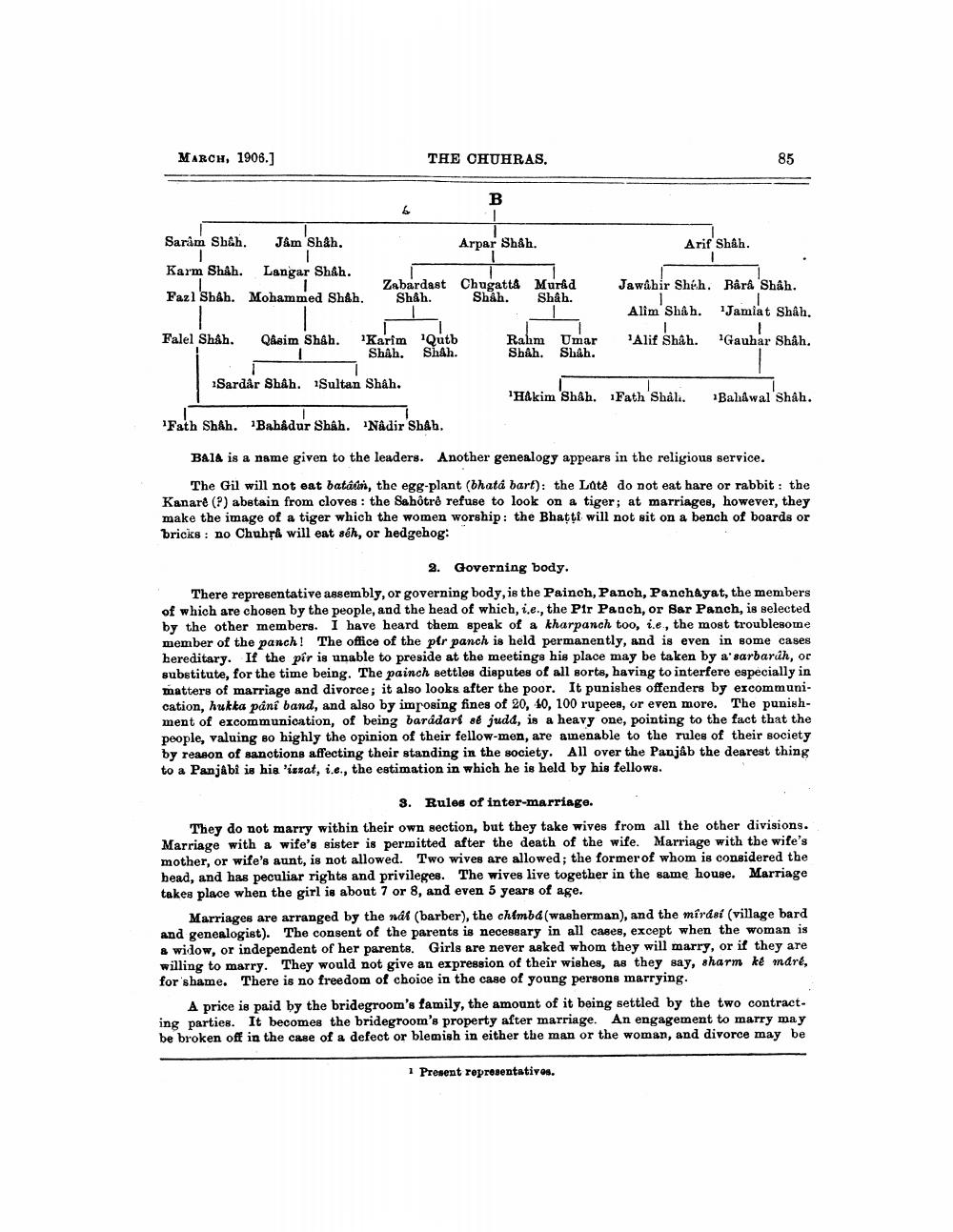________________
MARCH, 1906.]
THE CHUHRAS.
85
B
Arpar Shah.
Arif Shah.
Sarâm Shah. Jam Shah. Karm Shah. Langar Shah. Fazl Shab. Mohammed Shah.
Zabardast Chugattå Murid
Shâh. Shåh. Shah.
Jawabir Shéh. Bâra 'Shah.
Alim Shah. "Jamiat Shân. 'Alif Shah. 'Gauhar Shah.
Falel Shah.
Qasim Shah.
Karim Shah,
"Qutb Shah.
Rahm Umar
Shah. Shah.
Sardar Shah.
Sultan Shah.
Hakim Shah.
Fath Shal.
Bahawal Shâh.
'Fath Shah.
Bahadur Shah. Nadir Shah.
Bala is a name given to the leaders. Another genealogy appears in the religious service.
The Gil will not oat bataan, the egg-plant (thatá bart): the Late do not eat hare or rabbit : the Kanare (?) abstain from cloves: the Sahôtre refuse to look on a tiger; at marriages, however, they make the image of a tiger which the women worship: the Bhatti will not sit on a bench of boards or bricks: no Chuhsa will eat séh, or hedgehog:
2. Governing body. There representative assembly, or governing body, is the Painch, Panch, Panchayat, the members of which are chosen by the people, and the head of which, i.e., the Pir Panch, or Bar Panch, is selected by the other members. I have heard them speak of a kharpanch too, ie, the most troublesome member of the panch! The office of the per panch is held permanently, and is even in some cases hereditary. If the pir is unable to preside at the meetings his place may be taken by a' sarbarih, or substitute, for the time being. The painch settles disputes of all sorts, having to interfere especially in matters of marriage and divorce; it also looks after the poor. It punishes offenders by excommunication, hukka pani band, and also by imrosing fines of 20, 50, 100 rupeen, or even more. The punishment of excommunication, of being barádarí sé judd, is a heavy one, pointing to the fact that the people, valuing so highly the opinion of their fellow-men, are amenable to the rules of their society by reason of sanctions affecting their standing in the society. All over the Panjab the dearest thing to a Panjabi is hia 'istat, i.e., the estimation in which he is held by his fellows.
3. Rules of inter-marriage. They do not marry within their own section, but they take wives from all the other divisions. Marriage with a wife's sister is permitted after the death of the wife. Marriage with the wife's mother, or wife's aunt, is not allowed. Two wives are allowed; the former of whom is considered the head, and has peculiar rights and privileges. The wives live together in the same house. Marriage takes place when the girl is about 7 or 8, and even 5 years of age.
Marriages are arranged by the nat (barber), the chimba (washerman), and the mirdsi (village bard and genealogist). The consent of the parents is necessary in all cases, except when the woman is & widow, or independent of her parents. Girls are never asked whom they will marry, or if they are willing to marry. They would not give an expression of their wishes, as they say, sharm ke mdré, for 'shame. There is no freedom of choice in the case of young persons marrying.
A price is paid by the bridegroom's family, the amount of it being settled by the two contract. ing parties. It becomes the bridegroom's property after marriage. An engagement to marry may be broken off in the case of a defect or blemish in either the man or the woman, and divorce may be
1 Present representativos.




